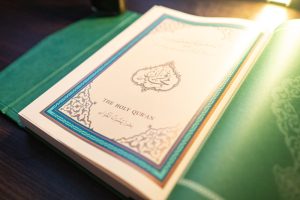
The Review of Religions is delighted to present the complete English translation of the commentary of Sūrah al-Ikhlāṣ – Chapter 112 of the Holy Qur’an – by Hazrat Mirza Bashiruddin Mahmud Ahmad (ra), translated into English for the first time.
Sūrah al-Ikhlāṣ, one of the shortest chapters in the Qur’an, discusses the unity of God, and so contains the essence of the entire Islamic teaching. Just as Sūrah al-Fātiḥah is considered to be an outline of the entire Qur’an, Sūrah al-Ikhlāṣ, together with the two succeeding chapters, Sūrah al- Falaq and Sūrah al-Nās, also contains the themes mentioned in Sūrah al-Fātiḥah. Indeed, in one tradition, the Holy Prophet (sa) stated that Sūrah al-Ikhlāṣ is equal to one-third of the Holy Qur’an.
This is one of the most insightful and in-depth commentaries of the Holy Qur’an ever written, and The Review of Religions has the honour of publishing it for our English readers for the first time.
By Hazrat Mirza Bashiruddin Mahmud Ahmad (ra), Second Worldwide Head of the Ahmadiyya Muslim Community
Translated by Murtaza Ahmad
Edited by The Review of Religions Translation Team
The Causes and Circumstances for Its Revelation
There are three types of narrations pertaining to the occasions and circumstances of revelation of this Sūrah. The first narration is that the polytheists of Makkah came to the Holy Prophet (sa) and said to him,
یَا مُحَمَّدُ اُنْسُبْ لَنَا رَبَّكَ
‘O Muhammad (sa)! Explain to us the lineage of your Lord.’ In response to this, Allah the Almighty revealed Sūrah al-Ikhlāṣ and explained that Allah neither has any father, nor does He have any son, and there is none equal to or similar to Him.[1]
This narration has been cited through varying chains of transmission and differences in the wording. Some narrations state that a Bedouin raised this question, whilst in others narrations this question was posed by the Quraish of Makkah. In any case, the same question was posed,
أُنْسُبْ لَنَارَبَّكَ
‘Explain to us the lineage of your Lord.’
It is evident that there is no truth in this narration because, logically, this question could only have been raised if the idols worshiped by the polytheists of Makkah had a lineage. When the idols had no lineage, why would the polytheists have even asked for the lineage of Allah Almighty to be described? Thus, rationally, it is inconceivable for the Quraish of Makkah to have posed this question.
Another narration states that the Jews of Khaibar came to the Holy Prophet (sa) and enquired from him:
خَلَقَ اللهُ الْمَلٰئِكَةَ مِنْ نُوْرِ الْحِجَابِ وَآدَمَ مِنْ حَمَأٍ مَّسْنُوْنٍ وَإِبْلِیْسَ مِنْ لَهَبِ النَّارِ وَالسَّمَآءَ مِنْ دُخَانٍ وَالْاَرْضَ مِنْ زَبَدِ الْماءِ فَأَخْبِرْنَا عَنْ رَّبِّكَ
That is, ‘Allah Almighty created the angels from divine light [nūr] and Adam from mud wrought into shape. He created Iblis from the flames of fire and the heavens from gasses [dukhān], and the land from the foam of water. So tell us how was Allah Almighty created and what was He created from?’ According to this narration, upon hearing this question, the Holy Prophet (sa) remained silent and did not reply until the angel Gabriel brought down this chapter (Qul Huwallāhu Aḥad) and the Holy Prophet (sa) then answered the question raised by the Jews.[2]
Reflecting on this narration, it seems logically impossible that the Jews would ask the Holy Prophet (sa) this question attributed to them, for they believed in the existence of Allah, and fully understood that He was the Creator. But the question of what He was created from cannot be raised. However, one may enquire about the attributes of God and the nature of those attributes.
Further, it is also illogical to assert that the Holy Prophet (sa) was silenced or unable to respond to the question posed by the Jews as until then, a large portion of the Holy Quran had been revealed, and the Holy Prophet (sa) could have replied based on it. The question raised by the Jews was not so difficult as to warrant the Holy Prophet (sa) remain silent. Therefore, this given reason for the revelation of Sūrah al-Ikhlāṣ which has been cited is erroneous.
A third narration states that this question was raised by the Christian delegation of Najran when they visited Madinah. It states that they asked,
[صِفْ لَنَا رَبَّكَ، أَمِنْ زَبَرْجَدٍ أَوْ يَاقُوْتٍ أَوْ ذَهَبٍ أَوْ فِضَّةٍ؟ فَقَالَ: إِنَّ رَبِّيْ لَيْسَ مِنْ شَيْءٍ، لِأَنَّهُ خَالِقُ الْأَشْيَاءِ، فَنَـزَلَتْ [قُلْ هُوَ اللهُ أَحَدُ
That is to say, ‘describe your Lord to us: is He made from a gemstone, ruby, gold or silver?’ In response to this question, the Holy Prophet (sa) said, ‘Allah is not created from such things, because these are all His creation and He is the Creator.’[3] Thereafter, [according to this narration] this chapter (Qul Huwallāhu Aḥad) was revealed, in which the answer to the question raised by the Christians was given.
Logically speaking, this narration is also flawed as the Christians also believe in God Almighty. Although they believe in god the son and god the Holy Spirit as well as God Himself, they nonetheless fully comprehend that God the Father is not an idol made from gold, silver, ruby or gemstones. So, from a rational standpoint it is implausible for them to have raised this question.
Therefore, all narrations pertaining to the circumstances of the revelation of Sūrah al-Ikhlāṣ are merely conjectural. None of them can be cited as the reason for the revelation of this illustrious and magnificent Sūrah. The fact of the matter is that Allah Almighty has concisely proclaimed His unity [tauhīd] so that every Muslim, young or old, understands it, and entrenches it in their mind, and considers it their duty to publicise it in every gathering.
Those who have narrated the context of the revelation [of this Sūrah] may have felt the need to identify its circumstances, owing to the word ‘Say’ [Qul] that has been used at the start of the chapter. This may have led to the misconception this this is being stated in response to a question. However, it is not necessarily the case that wherever the word ‘Qul’ is used in the Holy Quran, it is always in response to a question. In fact, generally, wherever this word is used, Allah commands that it is the duty of the Holy Prophet Muhammad (sa) as well as every member of the ummah to continuously announce this among the people and not to neglect the subject in discussion.
Serialisation Sūrah al-Ikhlāṣ of will continue in the next edition.
ENDNOTES
[1] Al-Durr al-Manthur.
[2] Ibid.
[3] Tafsir Imam Razi




Add Comment